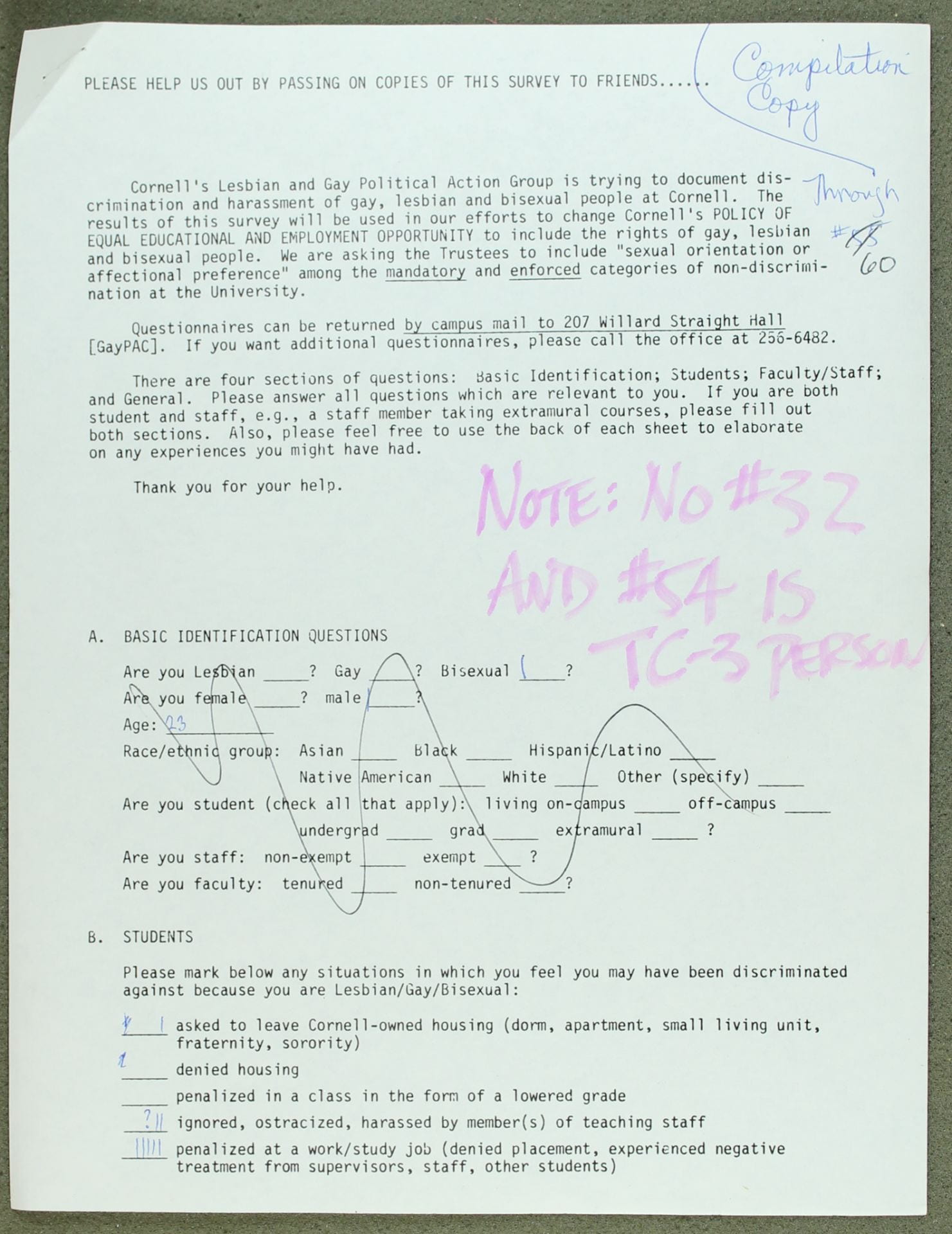by Bella Somoza, Class of 2022, Biological Sciences and History
In April of 1984, Cornell University’s Lesbian and Gay Political Action and Discussion Group (LAGPAD, founded 1984) circulated a survey around Cornell’s queer community in an effort to document acts of homophobia on campus. They were gathering evidence for an upcoming meeting with the Community Communications Committee of the Board of Trustees, where they wanted to push for an amendment to a clause prohibiting discrimination on the basis of sexual orientation in the university’s Policy on Equal Educational and Employment Opportunity. LAGPAD activists believed the statement was not enough since there were no legal ramifications if an LGBTQ+ individual was fired or discriminated against simply because of their sexuality. In short, the statement was not included in the legally binding portion of the equal opportunity policy, and LAGPAD was fighting to change that. The group received 58 anonymous surveys from students, staff, and faculty members of different sexual orientations, gender identities, ethnicities, and races.
While the survey did indicate that respondents had faced harassment by University administration in the classroom and workplace, it also revealed that the majority of individuals faced a pervasive form of homophobia that we would now refer to as microaggressions. 25 individuals indicated that they had been subjected to “queer” jokes, pressured into silence about their sexuality around their peers, or self-censored their speech when gay issues were raised (presumably out of fear that they would be harassed for their views). 14 respondents said they had been treated a certain way because their peers assumed they were straight; a common example given when asked to elaborate at the end of the survey was being set up with people of the opposite sex by co-workers. In an article from the May 1982 issue of The Advocate, Mark Schultz (a senior at Cornell), echoed the wearying effect of these microaggressions. He quoted another senior at Cornell who said “I can’t hide being gay. Each comment you let slip by, each faggot joke, tears away a little piece of yourself.” Another student in the article said the isolation of living in a heterosexual-dominated campus was “spiritually devastating.” While he acknowledged these acts of homophobia, Schultz also argued that things were getting better – there were less overt and violent acts of harassment on campus. As the survey indicates, perhaps violent acts gave way for an increasing number of microaggressions two years later.
Unfortunately, Cornell administration did not feel that the survey responses constituted enough proof of discrimination on campus. Microaggressions were not aggressive enough to merit interference. They tabled discussion of the proposed amendment in August 1984, and then two months later outright denied it. It took five more years for the Board of Trustees to finally prohibit discrimination on the basis of sexual orientation. Although the survey did not accomplish what LAGPAD wanted it to, their tireless efforts certainly paved the way for that 1989 decision. It did accomplish something else as well; the survey was an important outlet for students, staff and faculty who felt like they couldn’t talk about the homophobia they faced anywhere else. For once, they might have felt that there voices were heard, even if it wasn’t by the administration. LAGPAD’s efforts demonstrated to the Cornell community that queer students were going to fight for change, even when the administration tried to tell them change was not necessary.




Sources
Schultz, Mark. “Gay at Cornell.” The Advocate, May 13, 1982. LGBT Magazine Archive.
“Gay Political Action at Cornell: Campaign to Amend Policy on Equal Educational and Employment Opportunity.” News From GAYPAC, April/May 1984. Cornell Lesbian, Gay, Bisexual, and Transgender Coalition records, 1967-1999, Box 11, Folder 57. Human Sexuality Collection, Rare and Manuscript Collections. Cornell University Libraries.
Savin-Williams, Ritch C. “Personal Reflections on Coming Out, Prejudice, and Homophobia in the Academic Workplace.” In Homosexual Issues in the Workplace, edited by Louis Diament. Clinical and Community Psychology. N.p.: Taylor & Francis, 1993.
